(i) Has the World Stopped Having Sex?
(ii) Can Any Philosophical Question Be Answered With Certainty?
(iii) Panpsychism: Mysticism, Anti-Science… and Politics
(iv) Scientific Experts and Academics as a Priest Class
(v) Bigging-Up Peer-Reviewers (or Referees)
(vi) Scientists, Not Just Politicians & Activists, Abuse Science
(vii) Is There Too Much Analytic Philosophy?
Has the World Stopped Having Sex?
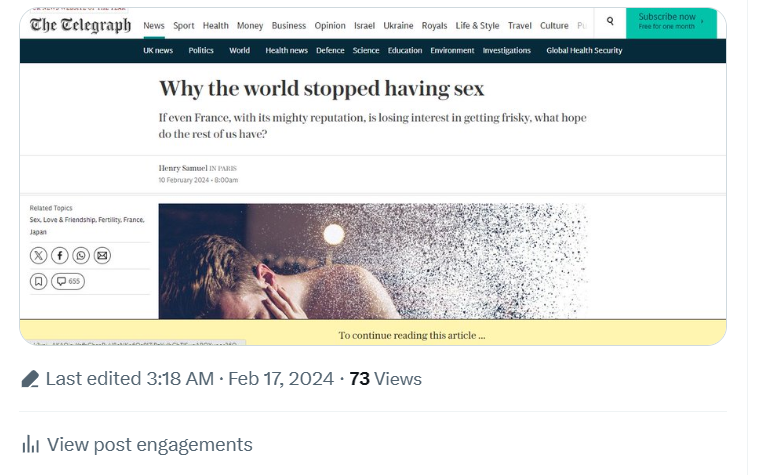
You can guarantee that the central claim of this Telegraph article is false. You can also guarantee that it doesn’t even deliver what its sexy title suggests.
And I’m not being pedantic here.
I don’t mean that it’s obviously false that “the world” has stopped having sex. I mean that the world doesn’t — or even can’t — have less sex…
That’s if this claim means anything at all.
I hate journalese. (It’s almost as bad as academese. )
I could read this. But it’s behind a paywall.
Can Any Philosophical Question Be Answered With Certainty?
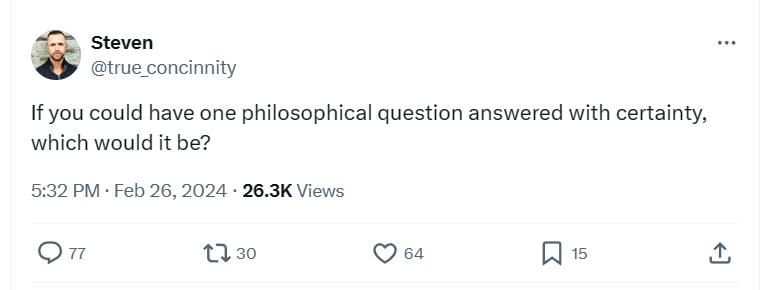
It would be weird — and even counterproductive to philosophy — for a philosophical question to be answered “with certainty”.
A mathematical or logical question could be answered in such a way. Perhaps even a factual question could be…
But a philosophical question?
What would make a philosophical answer certain?
What would a certain answer look like?
Would it be a long chain of true premises, followed by a logically-deduced conclusion?
Presumably, a philosophically certain answer couldn’t be a proof.
That’s because proofs don’t (really) exist outside logic and mathematics. (Even if philosophical reasoning sometimes includes mathematical and logical components.)
Psychologically, what would it mean to experience certainty about a particular answer?
And what if a person were psychologically certain about all the answers he assumes to be answers?
Of course, this simply shows us that psychological certainty is just that — a psychological matter. And that’s where proofs enter the picture — at least in logic and mathematics.
Panpsychism: Mysticism, Anti-Science… and Politics
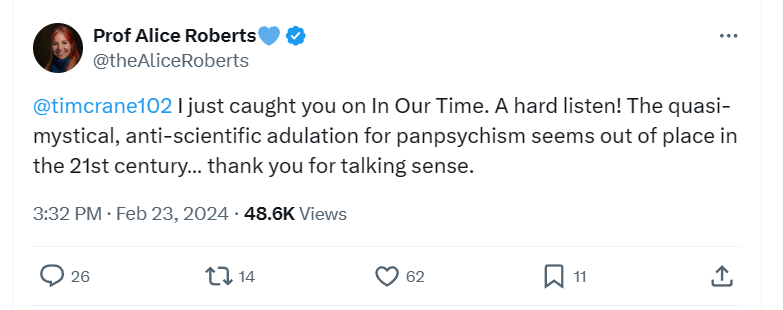
I wouldn’t say that all panpsychists are “anti-scientific”. (I’m not saying this is Prof Alice Roberts’ view either.) That said, it’s sometimes hard to tell.
Take the English philosopher Philip Goff.
As Tim Crane (implicitly) says in the thread, panpsychism isn’t necessarily tied to “mysticism”. That may be true. The thing is that many panpsychists do tie panpsychism to mysticism… and to religion, spirituality and ethics. Indeed, Philip Goff even ties panpsychism to various political positions. [See my ‘Professor Philip Goff’s (Panpsychist) Philosophy of Trees’. ]
Shorter
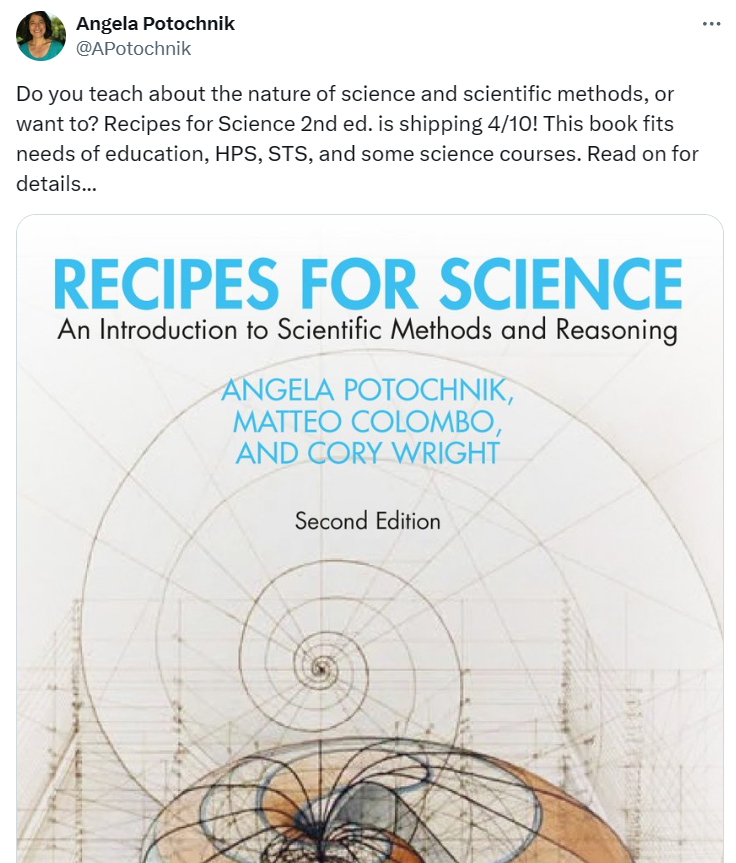
Glad to see the plural in the plural “scientific methods”, rather than the singular (platonic) “scientific Method”. That said, I’m not making some “relativist” or Feyerabendian point here. It’s just that there never was a single scientific method…
And I don’t believe that “anything goes” either.
Experts and Academics as a Priest Class
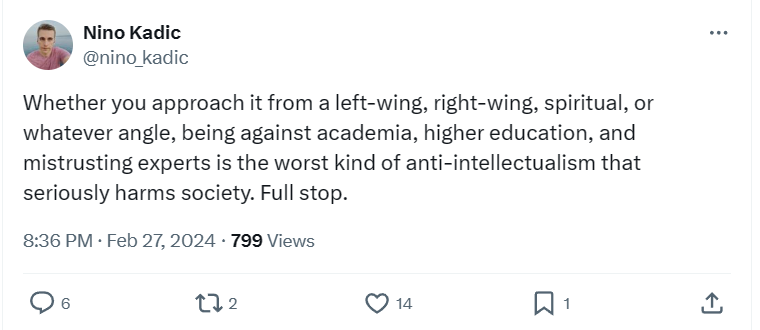
I’m not sure if there are many people who’re “against academia” and “mistrust experts”. Full stop.
The people I’m aware of are against particular aspects of academia. They’re also against particular academics and experts for doing (or not doing) particular things.
So let’s not conflate all these things.

Placing too much intellectual — and even political — power in the hands of narrow and specialised academics and platonic (scientific) Experts (“We is experts”) is to treat them as a priest class. And that “seriously harms society”…
Full stop.
Bigging-Up Peer-Reviewers (or Referees)
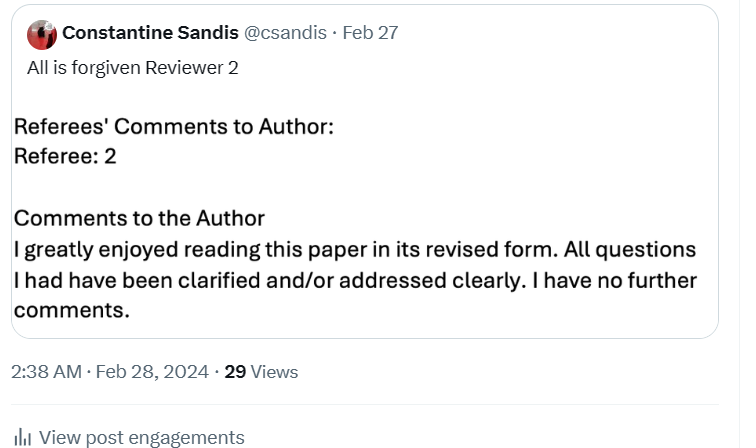
Wouldn’t it be the easiest thing in the world for a peer-reviewer to dress up his or her immediate political, philosophical or emotional distaste for a position (as advanced in a paper) with hoodwinking and deceitful academese? (Say, with a machinegun round of footnotes, jargon, etc. to tart up that simple emotional distaste.)
But there will be other peer-reviewers!
Sure, but they may well be the original the original peer-reviewer’s ideological or philosophical (in a manner of speaking) twin brothers.
Scientists, Not Just Politicians & Activists, Abuse Science
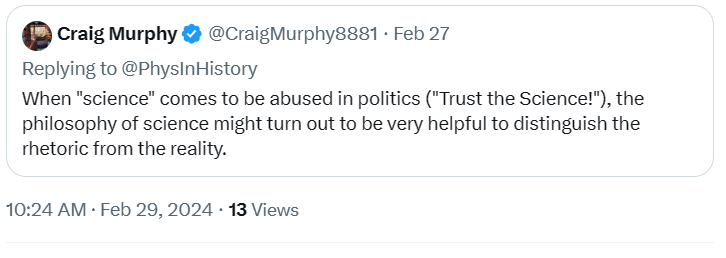
Scientists themselves can “abuse” science for political ends — not only politicians and political activists. There’s a mountain of evidence which shows that.
Also, if the philosopher agrees with the idea that science can be (or even must be) used for specific political or social ends, then he too may back up the original abusers of science — the scientists themselves.
Science can be a dirty political business. However, most of the time, it isn’t.
Is There Too Much Analytic Philosophy?
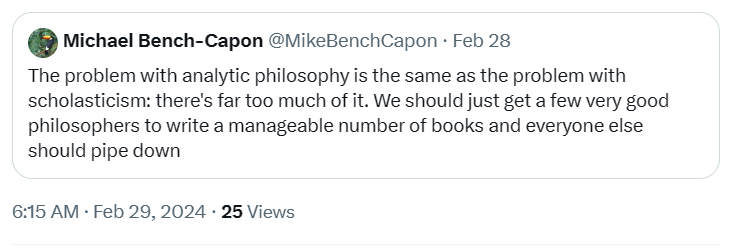
“The problem with analytic philosophy is the same as the problem with scholasticism: there’s far too much of it.”
— — Michael Bench-Capon
“Far too much” analytic philosophy compared to what?
Compared to Continental philosophy?
Compared to what’s produced in those departments which concentrate on “theory”, and politicised philosophy? Or compared to rare diamonds or pandas?
If Bench-Capon is making a point about too much academic philosophical work generally, then he may be right. But he singled out analytic philosophy. He didn’t single out Continental philosophy, Foucault Studies, the many departments which focussed on poststructuralism, Subaltern Studies, Critical Race Theory, Postcolonial Studies, Black Studies, Women’s Studies, etc.
Perhaps he just doesn’t like analytic philosophy. Full stop.
Perhaps he believes it’s not “politically engaged” and “committed” enough.
I don’t know.
But I do know some academics who do take these — and similar — positions against analytic philosophy.










No comments:
Post a Comment